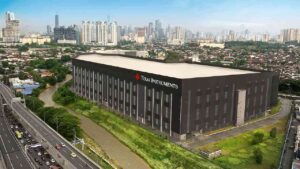Texas Instruments Incorporated (TI) has announced plans to expand its in-house production presence in Malaysia with two new assembly and test plants in Kuala Lumpur and Melaka. Together, these new investments will support TI's plan to in-house 90% of its assembly and testing operations by 2030 to gain greater control over supply.

Rendering of early plans for Texas Instruments' new assembly and testing plant next to the company's existing assembly and testing plant in Kuala Lumpur, Malaysia.
“We are encouraged by Texas Instruments’ continued confidence in Malaysia’s investment ecosystem,” said YB Senator Tengku Datuk Seri Utama Zafrul Bin Tengku Abdul Aziz, Minister for Investment, Trade and Industry (MITI). “TI’s plans to expand its assembly and testing operations reflect Malaysia’s clear positioning in the global semiconductor supply chain, while complementing the focus of our New Investment Policy and New Industrial Master Plan on attracting investment from high technology and high value to support our increasingly digitized global and domestic markets. savings.
He added: “Furthermore, expanding our country’s IT investment footprint will not only strengthen national value chains but also create high-yield, knowledge-based employment opportunities for Malaysians.”
The timing of the expansion also aligns with Malaysia's broader strategy to strengthen the semiconductor industry ecosystem and drive economic growth.
Datuk Wira Arham MIDA, CEO of the Malaysian Investment Development Authority (MIDA), reaffirmed MIDA's commitment to facilitating IT expansion and fostering a collaborative ecosystem.
“MIDA is fully dedicated to supporting IT expansion plans, which will not only bring significant investments but also improve analogue and integrated processing manufacturing capabilities for the country,” he said. “This partnership further solidifies Malaysia’s position as a leading hub in the region for semiconductor innovation.”
The announced expansion reflects the joint efforts of TI, the Malaysian government, especially MITI and MIDA to strengthen Malaysia's position in the semiconductor industry. These initiatives aim to boost economic growth, attract investment and promote the exchange of knowledge, contributing to the country's overall development.

Rendering of early plans for Texas Instruments' new assembly and testing plant next to the company's existing assembly and testing plant in Melaka, Malaysia.
“These investments are part of TI's long-term strategy to expand our internal manufacturing capacity to support the growing need for semiconductors and provide greater supply assurance,” added Yogannaidu Sivanchalam, vice president of assembly and test manufacturing operations at TI. YOU. “TI is proud to have operated in Malaysia for over 50 years, and our decision to expand our back-end production is a reflection of the talented and growing team in Malaysia that will be critical to the future of TI.”
Expanding in Kuala Lumpur
TI recently purchased the building next to its existing assembly and testing plant in Kuala Lumpur, which occupies an area of 18 acres. With a potential investment of up to MYR9.6 billion, the company plans to convert the building into an assembly and testing factory with over one million square feet of cleanroom space. Construction is expected to begin later this year, with production beginning as early as 2025.
The new factory will connect to the company's existing factory and create approximately 1,300 additional local jobs when fully constructed.
Construction underway in Malacca
TI is also building a new six-level assembly and testing factory next to the existing assembly and testing factory in Melaka. The new factory will include more than 400,000 square feet of cleanroom space and will connect to TI's existing factory. With a potential investment of up to MYR5 billion, this new factory will support up to 500 local jobs at full construction and is also expected to begin production as early as 2025.
Building in Malaysia
In full production, TI's new state-of-the-art factories in Malaysia will feature advanced industrial automation to assemble and test hundreds of millions of analog and embedded processing chips daily, which will be used in electronics everywhere – from from renewable energy to electric vehicles. .
At both plants, environmentally responsible construction methods that emphasize energy-efficient design will be used to meet one of the highest levels of structural efficiency and sustainability in the Leadership in Energy and Environmental Design (LEED) building rating system. ): LEED Gold.
Advanced equipment in factories will reduce waste, water and energy consumption per chip, further demonstrating TI's commitment to responsible and sustainable manufacturing.
Investing in manufacturing
TI has a long history of globally owned and regionally diversified in-house manufacturing operations. The company has 15 manufacturing facilities worldwide, including wafer fabs, assembly and test factories, and collision and probe facilities.
With plans to manufacture more than 90% of its products in-house by 2030, TI has the ability to provide customers with geopolitically reliable capacity for decades to come.

